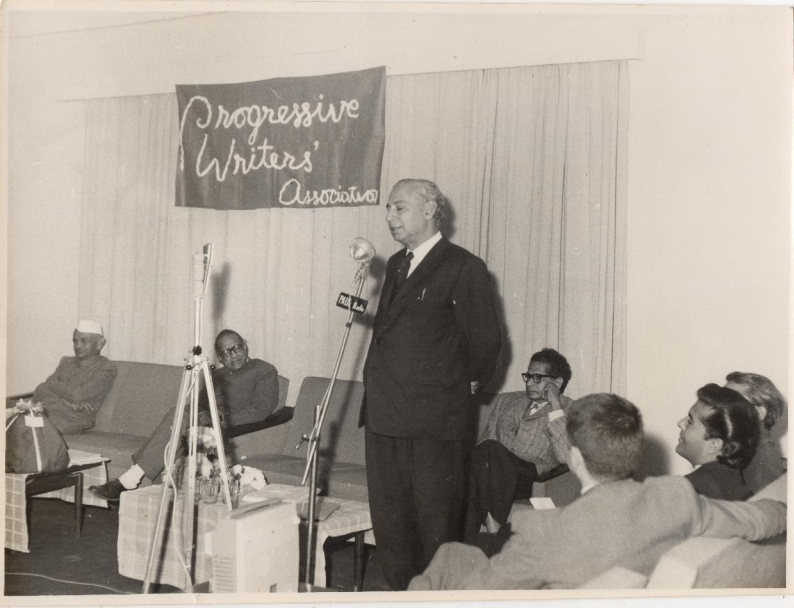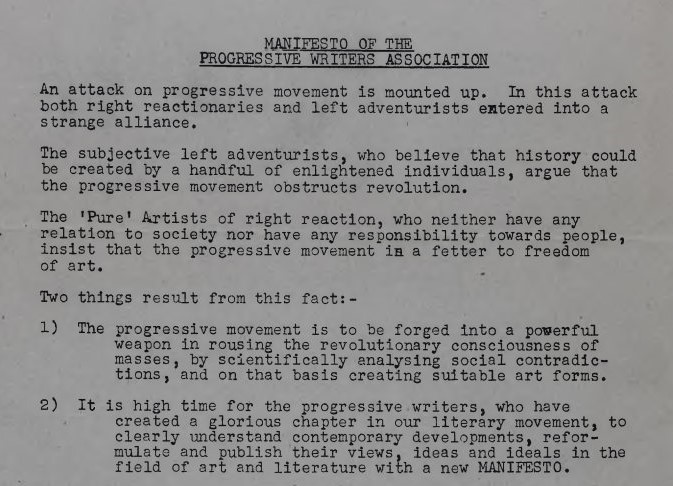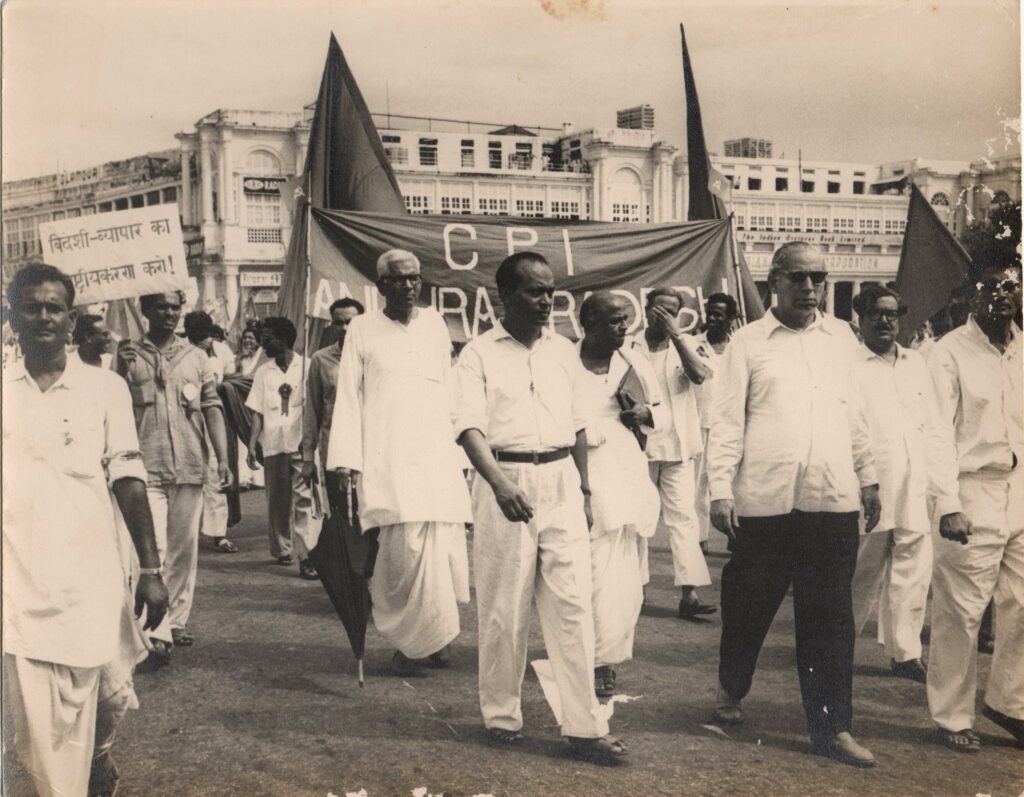Materials in the Archive
As the personal and working archive of an author, activist and family member, the Sajjad Zaheer Digital Archive is a rich collection of materials from letters to manuscripts to photographs. Highlighted below are items related to contemporaneous writers (including those affiliated with the Progressive Writers Association and the Afro-Asian Writers Association), politics (including the Rawalpindi Conspiracy and the Communist Party of India), and the Zaheer family (especially the works of Razia Sajjad Zaheer).
A searchable full inventory of the Archive can be found here.
The majority of the collection is in English (over 2000 items), Urdu (more than 1300 items), and Hindi (under 100 items) with some items in multiple languages.
HIGHLIGHTS
Progressive Writers Association

“…the Indian Progressive Writers’ Association, which held its first meeting in the back-room of the Nanking Restaurant in Bloomsbury, very likely on the evening of 24 November 1934. This London group developed a manifesto which went through various iterations and espoused broad, humanistic, leftward-leaning sentiments: the importance of literature in a free, democratic society, the responsibility of writers to challenge reactionary and retrograde forces in society, the role of writers in shaping the social and political fabric of a nation, the need for support—both moral and financial—for writers, etc. These concepts were being expressed among writers and intellectuals internationally too. The manifesto was eventually published in both India (in a Hindi translation) and in Great Britain…
“This organization was to become a major driving force in India’s intellectual life and was to heavily influence various Indian literatures, especially Urdu, for the next two decades.
“The dominant figure in this association was Sajjad Zaheer.”
Coppola, Carlo. “About the Author and His Works.” In A Night in London, Bilal Hashmi, translator. (New York, New Delhi: Harper Perennial, 2011) pp 148-150.
A sampling of materials related to the Progressive Writers’ Association (PWA) can be found here.
Further exploration of the full archive would reveal writings by authors associated with the PWA (for example, Mulk Raj Anand, Kishan Chander, Faiz Ahmed Faiz, Ali Sardar Jafri), operational documents of the Association and so on. Individual authors can be easily found using the pull down filter in the “author” or “addressee/other named person” columns in the full inventory.

Letters from Jail
“In 1951, a conspiracy involving a number of senior officers was brought to light by the government of Prime Minister Liaqat Ali Khan. The event, which became known as the Rawalpindi Conspiracy, was planned on 23 February 1951 at the Rawalpindi residence of Major General Akbar Khan. A number of prominent civilians with leftist leanings were also involved. These included the poet Faiz Ahmad Faiz and Sajad Zaheer, member[s] of the Communist Party. General Akbar Khan, in an article published in 1972, when he was serving the government of Zulfikar Ali Bhutto as minister of state for national security, revealed that the conspiracy’s objective was to overthrow the government of Liaqat Ali Khan and establish in its place a military council consisting of senior generals. Once installed in power, the military government was to reconstitute the Constituent Assembly after holding elections on the basis of adult franchise.
“There were a number of reasons for discontent among the senior ranks of the army, which persuaded some of them to conspire with General Akbar Khan. Rapid promotions following independence had raised unreasonable expectations of quick advance on the part of most young officers. This could not be realized once the army had reached what was then considered to be its stable size…. Finally, the officers were disillusioned with the lack of progress made by the politicians in giving the country a viable set of political institutions. The rapid progress made by India in this respect did not go unnoticed by the army officers. A special tribunal was constituted to try the conspirators. The conspirators were given long sentences, with the longest awarded to General Akbar Khan. Most of them were released in 1955.”
“Rawalpindi Conspiracy.” Historical Dictionary of Pakistan, edited by Shahid Javed Burki, 3rd ed., Scarecrow Press, 2006, pp. 438-439. Gale eBooks, link.gale.com/apps/doc/CX2535800464/GVRL?u=txshracd2598&sid=GVRL&xid=a6037ddf. Accessed 5 Jan. 2021.
A sampling of letters from jail can be found here.
One can also search the full inventory by date to discover correspondence during Zaheer’s time in jail (1951-1955).
Communist Party of India

The Archive contains a significant amount of material related to the Communist Party of India (CPI). Photographs and indirect CPI materials are available online but much of the CPI-related material was excluded from digitization as property of the CPI. For those materials, one can use the full inventory to identify relevant materials which could then be consulted onsite at the Ambedkar University Delhi.
Afro-Asian Writers Association
“In October 1958, over two hundred writers from Asia and the emerging African nations descended onto Tashkent, the capital of the Soviet Republic of Uzbekistan. Among the participants was W. E. B. Du Bois, who at age 90 had just flown in from Moscow (where he persuaded Nikita Khrushchev to found an Institute for the Study of Africa). Alongside leading Soviet writers and cultural bureaucrats, some of the major figures of the 1930s literary left outside of Europe or the Americas were in attendance: the Turkish modernist poet Nazim Hikmet and his Pakistani counterpart Faiz Ahmad Faiz, the Chinese novelist Mao Dun and Mulk Raj Anand…
“The gathering that brought all these writers together—the inaugural congress of what would later become known as the Afro-Asian Writers Association—represented the literary front of the Soviet Union’s return to the colonial question after a two-decade-long lapse…
“The Afro-Asian Writers Association was the main organizational vehicle of the Soviet engagement with postcolonial literatures. Although it fashioned itself as the literary equivalent of the Non-Aligned Movement, the Association was heavily aligned… The Association’s main goal was to forge an international alliance among the literatures of the two continents aimed at consolidating their forces and achieving independence from the publishing centers of Paris, London, and New York.”
Djagalov, Rossen. “The Afro-Asian Writers Association and Soviet Engagement with Africa.” Black Perspectives (November 2, 2017). https://www.aaihs.org/the-afro-asian-writers-association-and-soviet-engagement-with-africa/. Accessed 6 Jan 2021.
A sampling of materials related to the Afro-Asian Writers can be found here.
Razia Sajjad Zaheer


“Razia Sajjad Zaheer (1917-1979)… was one of Urdu’s most accomplished but least celebrated and acknowledged women writers. She was a novelist, short-story writer and translator, and a Communist activist and Progressive writer born in Ajmer in 1917. She won the Nehru Award in 1966. She had been contributing short stories to eminent journals like ‘Phool’, ‘Tehzib-e-Nisvaan’ and ‘Ismat’ since her childhood. Her other works include the Urdu novels ‘Sar-e-Shaam’ (1953), ‘Kaante’ (1954), ‘Suman’ (1963), and ‘Allah Megh De’ (1973), the short-story collections ‘Zard Gulaab’ (1981), ‘Allah De Banda Le’ (1984), ‘Nehru ka Bhateeja’ (1954) and ‘Sultan Zainul Abidin Budshah’ (1973) for children.”
Naeem, Raza. “Razia Sajjad Zaheer: The forgotten virtuoso of Urdu literature.” The Express Tribune (December 18, 2019). https://tribune.com.pk/article/92089/razia-sajjad-zaheer-the-forgotten-virtuoso-of-urdu-literature. Accessed 5 Jan 2021.

A sampling of materials written by Razia Sajjad Zaheer can be found here.
last update: 16 June 2023
